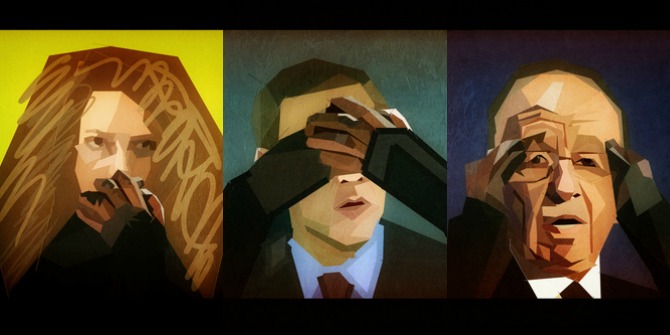 The ‘right to be forgotten’ ruling, which requires Google and others to acquiesce to individual requests to remove search results in certain circumstances, has generated much controversy. Pēteris Zilgalvis argues that the central issue relates to the rise of the ‘global village’, which is in some ways a return to the traditional village where everyone knows everything about everybody. We need to balance the perpetual access to all kinds of information with technological and legal frameworks which allow for fresh starts.
The ‘right to be forgotten’ ruling, which requires Google and others to acquiesce to individual requests to remove search results in certain circumstances, has generated much controversy. Pēteris Zilgalvis argues that the central issue relates to the rise of the ‘global village’, which is in some ways a return to the traditional village where everyone knows everything about everybody. We need to balance the perpetual access to all kinds of information with technological and legal frameworks which allow for fresh starts.
The ramifications and different interpretations of the ruling of the European Court of Justice in the “right to be forgotten” case (C-131/12), which stated that people can request search engines to remove links to information that is inaccurate, inadequate, irrelevant or excessive have been generating heated debate in the EU and beyond its borders. While the Court made it clear that the right to be forgotten is not absolute but must always be balanced against other fundamental rights such as freedom of media or speech, voices have been raised decrying the potential for the erection of a censorship regime. Is the end of free access to information imminent?
It could be helpful to frame the issues at stake differently. The central issue highlighted here is how to preserve some of the creativity related benefits of urban contexts when we are moving to a ‘global village’ of perpetual access to all kinds of information relating to individuals. Often, the vision of a global village in relation to the information society is presented solely in the positive sense as a utopia where the opportunity to connect and continually stay connected is available to ever more people.
However, in certain senses, rather than advancing into the future, we are in the process of going back to the past, to the milieu of the traditional village (not the semi-urban, bucolic village of the rich world’s glossy lifestyle magazines populated by second-home owners and the permanently resident neighbours not engaging with them). This is a return to a time when everybody knew everything that the neighbours were doing, what they planned to do and everything that they had ever done, and often what previous generations of their family had done. I recall some years ago talking to people on a sparsely populated Baltic island where almost the entire population had fled the Soviet onslaught by boat, except, as I was told, the families of “the thief” and “the drunk” who were not offered a place. Forty five years after the event, the descendants of these two families were pointed out to me, noting their familial “sins”. This was a context in which things were never forgotten, about individuals or about their families. Such social control and traditionalism had some positive communitarian and maintenance of order aspects, but were also seen as stifling and confining by many.
With the growth of cities, opportunities arose for people to escape the confines of the village, their past and tradition by moving into an urban environment or abroad (often into an urban environment), reimagining themselves and projecting a new image. The effect was magnified by accelerated urban growth during the industrial revolution, and by vast waves of emigration to both urban environments and the “New World”. In real life and literature, we can find numerous examples of individuals who left behind unrequited loves, modest family backgrounds, business or academic failures, abject poverty, the confines of ethnic or religious identities, petty crime (for example, that part of the emigration to Australia) or ill-considered decisions. While this sometimes resulted in continued failures or even tragedy in another location, it was also a powerful engine for entrepreneurship, innovation, invention, creativity and a fuller use of talent and skills that were underused or discriminated against in their village of origin. Today’s concepts of “smart failure” and serial entrepreneurship are developing in the same spirit of leaving mistakes or errors behind, not necessarily being erased, but being forgiven and not recalled endlessly.
Negative information about individuals certainly circulated in such urban contexts, either by word of mouth or in newspapers, for instance. However, a big difference between that environment and our Internet search-engine age is that eventually people would stop talking about relatively minor indiscretions and, if it was not a continuing scandal, the newspaper came out one day and then soon disappeared into the archives. It generally did not circulate endlessly. It was not gone, a reader could remember it, someone researching an issue or person could find it, but it usually required some effort on their part. In the Internet search engine enabled age, the big difference is that for some individuals it is like the same newspaper is coming out again day after day, every time that the person’s name is typed into a search box, relating the same information, forever. This is a substantial change in the sharing of and retention of information resulting in a new perpetuity of information that earlier would have simply faded into the past.
It is of course necessary to underline that we are talking about inaccurate, inadequate, irrelevant or excessive information, not information about an individual of public interest such as serious offences like murder, robbery or corruption which should not be forgotten. Also, information about people holding or aiming to enter public office should be readily and easily accessible to voters and citizens. It can also be taken as a given that transparency and equal access to information are essential components of functioning liberal democracy and free markets.
The European Court of Justice has spoken in regard to the European Union and has started an international legal and political debate. In the EU, as well as in other jurisdictions, the courts may be called upon to rule on related topics thus developing more detailed guidance, and inevitably decisions will be taken on regulation implementing the Right to be Forgotten and more broadly in defining what kind of society and information society we want to live in. Either society will have to change, so that everyone gets used to knowing everything that everyone they meet has done and accepts their faux pas, indiscretions, failures and bad hair days of the past despite being reminded of them, or the technological and legal frameworks will have to change to allow fresh starts. It will ultimately be a political decision about what type of information should be forgotten and what must always be remembered.
Note: This article gives the views of the author, and not the position of the British Politics and Policy blog, nor of the London School of Economics. Please read our comments policy before posting. Featured image credit: Robert Scoble CC BY 2.0
 Pēteris Zilgalvis is a Visiting EU Fellow 2013-14, at St. Antony’s College, University of Oxford.
Pēteris Zilgalvis is a Visiting EU Fellow 2013-14, at St. Antony’s College, University of Oxford.







